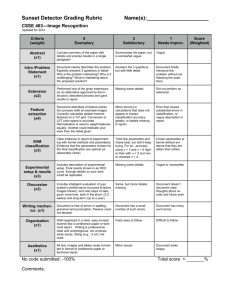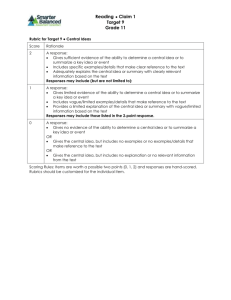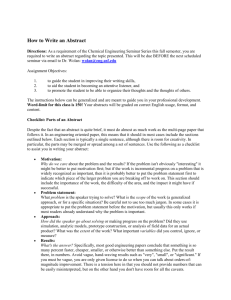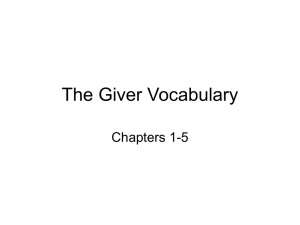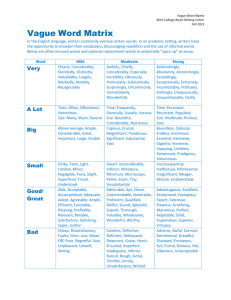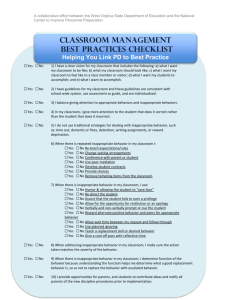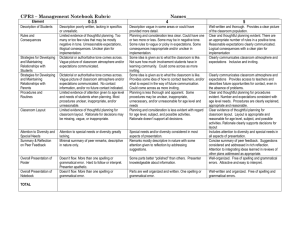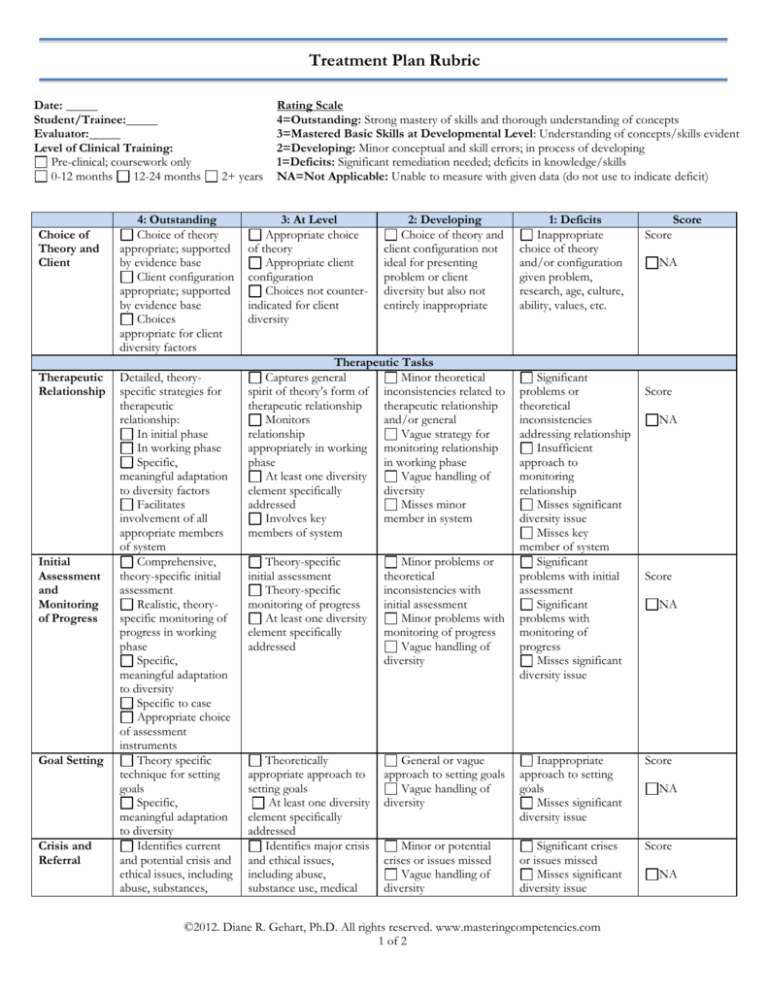
Treatment Plan Rubric
Date:
Student/Trainee:
Evaluator:
Level of Clinical Training:
Pre-clinical; coursework only
0-12 months
12-24 months
Choice of
Theory and
Client
Therapeutic
Relationship
Initial
Assessment
and
Monitoring
of Progress
Goal Setting
Crisis and
Referral
2+ years
4: Outstanding
Choice of theory
appropriate; supported
by evidence base
Client configuration
appropriate; supported
by evidence base
Choices
appropriate for client
diversity factors
Detailed, theoryspecific strategies for
therapeutic
relationship:
In initial phase
In working phase
Specific,
meaningful adaptation
to diversity factors
Facilitates
involvement of all
appropriate members
of system
Comprehensive,
theory-specific initial
assessment
Realistic, theoryspecific monitoring of
progress in working
phase
Specific,
meaningful adaptation
to diversity
Specific to case
Appropriate choice
of assessment
instruments
Theory specific
technique for setting
goals
Specific,
meaningful adaptation
to diversity
Identifies current
and potential crisis and
ethical issues, including
abuse, substances,
Rating Scale
4=Outstanding: Strong mastery of skills and thorough understanding of concepts
3=Mastered Basic Skills at Developmental Level: Understanding of concepts/skills evident
2=Developing: Minor conceptual and skill errors; in process of developing
1=Deficits: Significant remediation needed; deficits in knowledge/skills
NA=Not Applicable: Unable to measure with given data (do not use to indicate deficit)
3: At Level
Appropriate choice
of theory
Appropriate client
configuration
Choices not counterindicated for client
diversity
2: Developing
Choice of theory and
client configuration not
ideal for presenting
problem or client
diversity but also not
entirely inappropriate
Therapeutic Tasks
Captures general
Minor theoretical
spirit of theory’s form of inconsistencies related to
therapeutic relationship
therapeutic relationship
Monitors
and/or general
relationship
Vague strategy for
appropriately in working monitoring relationship
phase
in working phase
At least one diversity
Vague handling of
element specifically
diversity
addressed
Misses minor
Involves key
member in system
members of system
1: Deficits
Inappropriate
choice of theory
and/or configuration
given problem,
research, age, culture,
ability, values, etc.
Significant
problems or
theoretical
inconsistencies
addressing relationship
Insufficient
approach to
monitoring
relationship
Misses significant
diversity issue
Misses key
member of system
Significant
problems with initial
assessment
Significant
problems with
monitoring of
progress
Misses significant
diversity issue
Score
Score
NA
Score
NA
Theory-specific
initial assessment
Theory-specific
monitoring of progress
At least one diversity
element specifically
addressed
Minor problems or
theoretical
inconsistencies with
initial assessment
Minor problems with
monitoring of progress
Vague handling of
diversity
Theoretically
appropriate approach to
setting goals
At least one diversity
element specifically
addressed
Identifies major crisis
and ethical issues,
including abuse,
substance use, medical
General or vague
approach to setting goals
Vague handling of
diversity
Inappropriate
approach to setting
goals
Misses significant
diversity issue
Score
Minor or potential
crises or issues missed
Vague handling of
diversity
Significant crises
or issues missed
Misses significant
diversity issue
Score
©2012. Diane R. Gehart, Ph.D. All rights reserved. www.masteringcompetencies.com
1 of 2
Score
NA
NA
NA
Aftercare
Plan
Client Goals
Intervention
Client
Perspective
Overall Plan
threats of harm
Specific and
appropriate referrals
Specific,
meaningful adaptation
to diversity
Theory-specific
Client specific
Practical and
realistic
Theory-specific and
reveal understanding of
key concepts
Clear progression
from early to late
phases
Address all
problems identified in
case conceptualization
Client specific
Goals go beyond
samples in text
Theory-specific
Clearly related to
goal
Detailed and
tailored to client
Addresses all
members of client
system
Detailed
description of areas of
agreement and
disagreement
Notable insight into
how client views
process
Demonstrates
subtle understanding of
theory and applies
appropriately
Plan clearly in
accordance with
practice setting, legal
and professional
requirements
Demonstrates clear
understanding of risks,
benefits of treatment
issues, threats of harm.
Appropriate referral
At least one diversity
element specifically
addressed
Appropriate
Theory-specific
Minor problems
Unrealistic or
inappropriately adapted
for client
Goals and Interventions
Theory-specific
Appropriate but not
Progression from
clearly theory-specific
early to late phases
Vague or not client
Address most issues
specific
in case conceptualization
Miss one or more
Client specific
issue that needs clinical
attention
Theory-specific
Supports goal
achievement
Appropriate
Identifies meaningful
areas of agreement and
disagreement
Not clearly theoryspecific
Not clearly related to
stated goal
Minor problems
identifying areas of
agreement and
disagreement
Little evidence of
considering client
perspective
Overall Plan
Consistent and
Some problems with
appropriate use of a
understanding of
single theory
theories and techniques
Plan generally in
Goals/interventions
accordance with practice often not consistent with
setting, legal and
theory
professional
Minor problems with
requirements
plan’s compliance with
Appropriate
practice, legal, and/or
understanding of risks,
professional
benefits of treatment
requirements
Inappropriate for
theory
Unrealistic or
inappropriately
adapted for client
Score
Does not address
one or more key
clinical issue
Goals too vague to
be useful
Goals
inappropriate
Score
Not appropriate
for theory
Not appropriate
for goal
Inappropriate or
poor fit for client
Score
Significant
problems identifying
areas of agreement
and disagreement
Little evidence of
considering client
perspective
Score
Inconsistent or
incorrect use of theory
Significant
problems with plan’s
compliance with
practice, legal, and/or
professional
requirements
Score
Comments:
©2012. Diane R. Gehart, Ph.D. All rights reserved. www.mftcompetencies.org
2 of 2
NA
NA
NA
NA
NA

